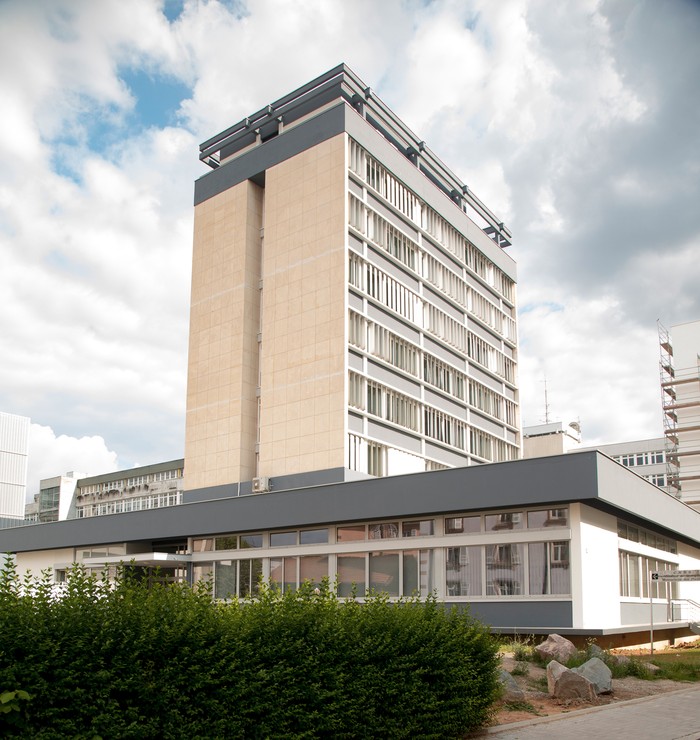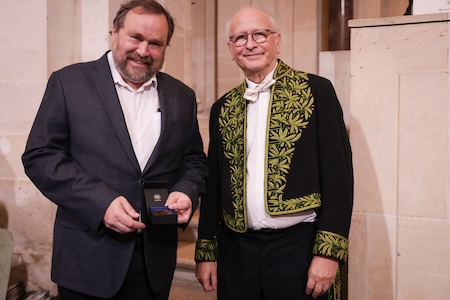Institut de recherche mathématique avancée
L'institut
À la une
Agenda
-
Jeudi 5 mars 2026 - 09h00 Séminaire Sem in
-
Giulia Sambataro :
An introduction to reduced basis method
- Lieu : Salle de séminaires IRMA
-
Résumé : In this talk, I will give an introduction to a class of model reduction techniques for parametric partial differential equations, the so-called Reduced Basis (RB) method. Parameters can represent geometric configuration, physical properties, boundary conditions or source terms. These techniques are motivated by applications such as design, control or optimization: they provide low-dimensional and hence rapidly computable approximations for the solution. Important aspects are basis generation and certification of the simulation results by suitable a posteriori error control. I will close the presentation with a few of my research developments.
-
Jeudi 5 mars 2026 - 11h00 Séminaire Analyse
-
Yingtong Hou :
BPHZ renormalisation of invariant measures via multi-indices
- Lieu : Salle de conférences IRMA
-
Résumé : In this talk, we provide a method to obtain the renormalised measures in quantum field theory by renormalising the cumulant expansion of the original measures. After reviewing the main ingredients of renormalisation: cumulant expansion, Wick renormalisation, Feynman diagrams, we introduce our approach based on BPHZ renormalisation via multi-indices which are combinatorial objects originating from describing scalar-valued singular SPDEs. To automate the renormalisation procedure, we propose a multi-index counterpart of the Hopf-algebraic program initiated by Connes and Kreimer for the renormalisation of Feynman diagrams. This is a joint work with Yvain Bruned.
-
Jeudi 5 mars 2026 - 14h00 Séminaire Arithmétique et géométrie algébrique
-
Alessio Bottini :
The period-index problem for hyper-Kähler varieties
- Lieu : Salle de séminaires IRMA
-
Résumé : The period-index conjecture is a fundamental problem concerning the Brauer group of algebraic varieties. For hyper-Kähler varieties, whose (birational) geometry is controlled by the second cohomology, it is expected that a stronger form of this conjecture holds. In this talk, I will present joint work with Daniel Huybrechts that provides new evidence for this expectation.
Following a brief introduction to the problem, I will discuss a proof of a variant of the conjecture where the classical index is replaced by a Hodge-theoretic one. Then, I will explain how to verify the conjecture for most Brauer classes on hyper-Kähler varieties of K3n-type.
-
Jeudi 5 mars 2026 - 16h30 Séminaire Doctorants
-
Lauriane Turelier :
An introduction to the Besov spaces and an application to PDEs.
- Lieu : Salle de conférences IRMA
-
Résumé : In the study of PDEs, it is essential to identify the relevant functional space and to know its properties. The two most commonly used types of spaces are Lebesgue spaces and Sobolev spaces. In this talk, I will introduce another class of functional spaces : Besov spaces, with some of their topological properties. Finally, I will present an application to the study of PDEs.
-
Vendredi 6 mars 2026 - 11h00 Séminaire Statistique
-
Hugo Henneuse :
Estimation de Modes Multiples et Homologie Persistante
- Lieu : Salle de séminaires IRMA
-
Résumé : La détection et la localisation des modes d'une densité de probabilité (i.e., les points où la densité atteint un maximum local) constituent un problème classique de statistique non paramétrique. L’estimation du mode global, lorsqu’il est unique, en particulier pour les densités unimodales, a longtemps concentré l’attention, conduisant à la fois à la conception d’algorithmes efficaces et à une caractérisation précise des vitesses minimax sous différentes hypothèses sur la densité sous-jacente. Le problème plus général de l’estimation de l’ensemble des modes est plus difficile. Plusieurs approches ont été proposées, notamment les méthodes de type mean-shift, qui donnent des résultats satisfaisants en pratique, mais dont les performances restent peu comprises théoriquement. Dans cette présentation, nous proposerons une alternative fondée sur un outil central de l’analyse topologique des données (TDA) : l’homologie persistante et sa représentation pratique via les diagrammes de persistance. Nous présenterons plusieurs résultats sur la consistance de cette approche, pour de larges classes de densités pouvant admettre des discontinuités (y compris en les modes) ainsi que son optimalité au sens minimax. Au-delà de l’estimation des modes, nous discuterons également du problème de l’estimation des diagrammes de persistance pour de telles densités.
-
Lundi 9 mars 2026 - 14h00 Séminaire Géométrie et applications
-
Manuel Rivera :
String topology: old and new
- Lieu : Salle de séminaires IRMA
-
Résumé : String topology studies algebraic structures arising from the interactions of loops and paths on a geometric space. The subject originated in 1999 with work of Chas and Sullivan who discovered that classical Poincaré duality and intersection theory has a rich manifestation on the homology of the free loop space, recovering structures also appearing in mathematical physics such as BV-algebras, TQFTs, and Lie bialgebras. This insight emerged from the broader question: what characterizes the algebraic topology of manifolds? Since then, string topology has developed into a vibrant area, revealing a wealth of new operations describing string interactions, with deep connections to knot theory, symplectic geometry, homotopy theory, homological algebra, and mathematical physics. In this talk, I will survey some developments from the past decade regarding new understanding of the structure and computations in string topology as well as their significance in other fields of mathematics, with focus on operations that capture geometric information beyond the oriented homotopy type of the underlying manifold.

